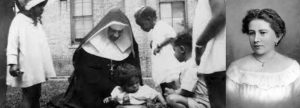Katherine Drexel
WORD OF THE DAY
PERSONAL CONTEXT
HISTORICAL CONTEXT
SUCCESS PRINCIPLE
CIVICS LESSON
Click below to listen to audio:
EMBRACE YOUR CALLING TO SERVE
If we wish to serve God and love our neighbor well, we must manifest our joy in the service we render to Him and them.
Let us open wide our hearts. It is joy which invites us. Press forward and fear nothing.
Saint Katharine Drexel
In January 1887 Katharine Drexel and her two younger sisters Elizabeth and Louisa received a private audience with Pope Leo XIII. Heiresses to a sizable fortune, the sisters were committed to direct some funding to address the societal disadvantages of Native Americans and African Americans. They discussed this mission with the Pope and requested missionaries to staff the work that they were looking to establish in the southwestern United States. The Pope encouraged Katharine to become a missionary herself, and she eventually accepted that calling; she described the process of her submitting to the divine direction for her life.
It is a lesson we all need – to let alone the things that do not concern us. He has other ways for others to follow Him; all do not go by the same path. It is for each of us to learn the path by which He requires us to follow Him, and to follow Him in that path.
Drexel established with a dozen other nuns the Sisters of the Blessed Sacrament and built the motherhouse in Bensalem, Pennsylvania. In 1894 they launched their first school, St. Catherine’s Indian School, in Santa Fe, New Mexico. In addition to starting missions and schools through her own Blessed Sacrament congregation, Drexel encouraged then financed the work of friars among the Navajo and Pueblo tribes of Arizona and New Mexico. Over the decades of her ministry, Drexel launched 145 missions, 12 schools for Native Americans, 50 schools for African Americans, and Xavier University, which, located in Louisiana, is the only historically Black Catholic college in the United States. Largely because of her prodigious works of compassion, Drexel was canonized by the Roman Catholic Church in 2000, becoming only the second American to be canonized a saint, the first who was actually born a U.S. citizen.
Drexel embraced her calling to serve, it centered her life, and she bore great fruit as a result. You can have similarly positive impact if you embrace your calling to serve and make compassion a central part of your life; to do so, be sure to be:
CALLED
To be called, you have to be listening. If you’re so full of your own thinking, there won’t be any space in your consciousness for a divine voice to be heard. Do your best to quiet the noise of your ideas. Incline your ear heavenward. Discern the truth in the spiritual whispers. Drexel made her move after she heard the Pope’s voice. Wait on your divine sign. When you discern it, make moves accordingly.
CENTERED
Embrace your core values. Try to avoid running to every conference with a nice slogan or a big promise. Drexel was committed to social justice and directed her ministry accordingly. Set your moral compass to keep clear the difference between acceptable and unacceptable behavior. Maintain your calling at the center of all you do.
CRUSADING
There are so many young people who live in environments that lead them into early confrontations with the criminal justice system, landing them in jail or a juvenile delinquency program. Drexel set up academic and spiritual interventions to guide youth in positive directions. She believed that a compassionate society should create nurturing environments to bring young people to moral maturity without suffering through the severity of penal sanctions. Do as much as you can to steer individuals, especially young ones, away from detours of trouble and onto pathways of achievement.
KEY POINTS
WORD OF THE DAY
Prodigious – remarkably or impressively great in extent, size, or degree.
PERSONAL CONTEXT
Born in 1858 in Philadelphia into a wealthy family, Katherine Drexel learned charity during her upbringing. Katherine and her sisters helped with the family of tradition of distributing clothing and food from their home three times a week. She also traveled extensively during her upbringing. One of her trips to the Western U.S., Drexel observed the impoverishment of Native Americans, which made a lasting impression on her.
HISTORICAL CONTEXT
During the last half of the 19th and into the 20th century, Drexel took on the challenge of educating Native American and African American youth, which was key to the social progress of these groups. When she proclaimed her vows and became Mother Katherine in the early 1890s, she affirmed her commitment to focus her religious philanthropy among Indigenous and Black people in the U.S. Southwest and West.
SUCCESS PRINCIPLE
See Success Principle Worksheet
CIVICS LESSON
See Civics Lesson Worksheet


